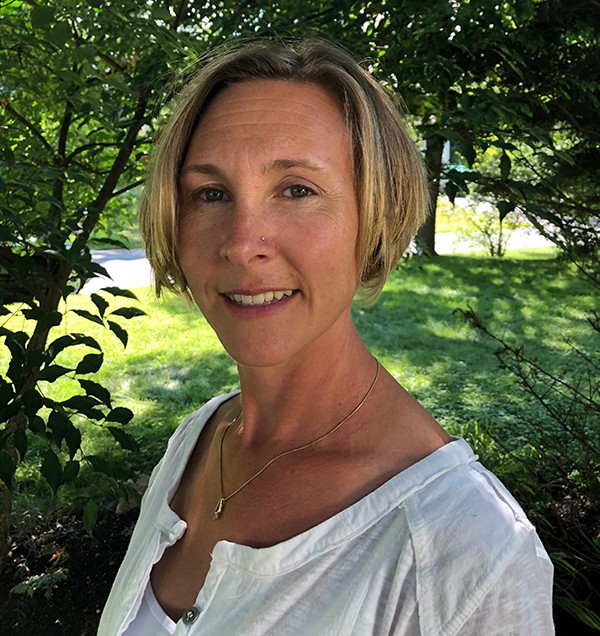
Rebecca Keys, MSW ’21
It was early in the morning on March 25 when Rebecca Keys, MSW ’21, headed into Boston for a day at the Massachusetts State House. She was joining her classmates from Professor Shanta Pandey’s Social Welfare Systems class for the National Association of Social Workers (NASW) annual Legislative Education and Advocacy Day (LEAD).
Across the country, local chapters of the NASW host an annual day for social work students and professionals to learn more about the legislative process and to witness how advocacy efforts factor into passing bills that affect their clients and the field. “This assignment links practice with policy,” explained Pandey. “We want our graduates, many of whom go into clinical practice, to work closely with policy makers so that their feedback can help to amend policies in a way that is beneficial to their clients.”
In Boston, participants attended a pre-event welcome meeting at Faneuil Hall before continuing on to the Massachusetts State House for 45-minute panels on bills on the NASW-MA’s legislative agenda, followed by short lobbying appointments with state legislators or their aides.
Keys chose to lobby for bill SB825-HB1486, which proposes gradually raising the age of juvenile jurisdiction to include individuals from 18–20 years old, allowing them to stay within a developmentally appropriate justice system. “My first semester class, Diversity and Cross Cultural Issues, challenged me to consider that mass incarceration may be the new Jim Crow,” she said. One of her class readings (Selen Siringil Perker and Lael Chester’s Emerging Adults: A distinct population that calls for an age-appropriate approach by the justice system) states that in 2016, 70 percent of emerging adults incarcerated in state prisons were African Americans and Hispanics. And that in 2011, 76 percent of 18- to 24-year-olds released from Massachusetts’s county jails and state prisons were re-arraigned within three years. “Raising the age of juvenile offenders would reduce recidivism because rehabilitation is built into Massachusetts’s juvenile justice system with services, education, and job training.”
Prior to her lobbying appointment, Keys attended a corresponding panel discussion with Senator Joseph Boncore, one of the sponsors of the bill, and Sana Fadel, deputy director at Citizens for Juvenile Justice, a nonprofit that seeks to improve the juvenile justice system within the state. “It was nice to see the elected official and the advocate, both pushing for change, and hearing the rationale driving their efforts,” said Keys.
She and several fellow students then met with the aide to her state senator, Karen Spilka. “As senate president, Senator Spilka is not able to sponsor bills, but prior to her election as senate president she had sponsored a bill, now signed into law, raising the age of juvenile offenders to 17 years. Her aide listened to our stories, answered our questions, and assured us that he would pass on our desire for her support as well as the statistics and information we had gathered in support of the bill,” said Keys. As of this writing, the bill has been referred to the Joint Committee on the Judiciary for a hearing.
“ Social workers can be a voice for those who often aren’t heard. We have unique insight into the experiences of vulnerable populations, and a responsibility to bring that to our policy makers. Advocating at a policy level has taken on more meaning, and through LEAD, I’ve seen that even a few voices can really make a difference. ”
For Keys, the day was a chance to see the legislative process in action, and to advocate for a bill that connects her drive for social justice with her rationale for making a career shift to social work.
A first-year student in the three-year clinical program, Keys came to BCSSW with a master’s in community education and nonprofit administration and having spent nearly 20 years raising her family. In 2015, she began volunteering at RIA House, a small but growing nonprofit organization in Boston’s MetroWest that provides community-based services and support for women who have experience in the commercial sex trade. After working closely with a client for two years, she realized she wanted to deepen her work with vulnerable populations and pursue a degree in social work. “Anyone involved in the commercial sex trade, which girls enter at an average age of 15, is at risk of incarceration. If they can receive rehabilitative services through the passage of SB825-HB1486, they are more likely to avoid re-exploitation and re-arraignment,” explained Keys.
Her first year of classes and LEAD experience have combined with her work at RIA House to create a broader vision and understanding of the practice of social work. “I’ve learned how legislative policies inform our hands-on work with clients. Social workers can be a voice for those who often aren’t heard. We have unique insight into the experiences of vulnerable populations, and a responsibility to bring that to our policy makers. Advocating at a policy level has taken on more meaning, and through LEAD, I’ve seen that even a few voices can really make a difference,” Keys said.

